Time is Money: 7 Ways a Virtual Assistant Can Save You 20+ Hours a Week

In today’s competitive business landscape, time isn’t just valuable—it’s everything. Whether you’re a real estate agent, investor, or entrepreneur, the goal is the same: focus your energy on activities that grow your income. That’s where a virtual assistant comes in.
A virtual assistant (VA) is a skilled remote worker who can take over routine tasks, allowing you to prioritize revenue-generating opportunities. In this post, we’ll explore 7 highly effective ways a virtual assistant can save you 20+ hours each week—and exactly how each method works in a real-world setting.
Let’s dive in.
1. Managing Emails and Scheduling
How it works:
We all know how quickly emails pile up. Between spam, newsletters, client follow-ups, and meeting requests, you can easily lose hours each day.
A virtual assistant can:
-
Monitor your inbox throughout the day
-
Prioritize and flag important messages
-
Respond to routine inquiries using predefined templates
-
Schedule meetings via platforms like Calendly or Google Calendar
-
Confirm appointments and send reminders
Example:
If you’re a real estate agent, your VA can reply to buyer inquiries with pre-written info packets, schedule viewings, and ensure follow-ups happen automatically after open houses.
Result:
This saves you at least 3–5 hours per week while maintaining excellent communication standards.
2. Social Media Management
How it works:
Social media is vital for visibility—but time-consuming to manage. A virtual assistant can handle everything from content creation to community engagement.
Tasks include:
-
Scheduling posts via tools like Buffer or Later
-
Creating graphics with Canva
-
Responding to comments and DMs
-
Researching trends and hashtags
-
Reposting testimonials, listings, or blogs
Example:
Real estate professionals often use Instagram, Facebook, and LinkedIn to build brand presence. A virtual assistant can maintain consistent posting, freeing you from daily content planning.
Result:
Cutting social media workload saves 3–4 hours each week without sacrificing consistency or quality.
3. CRM and Database Management
How it works:
A robust Customer Relationship Management (CRM) system is useless if it’s not updated regularly. A virtual assistant ensures that your client and lead information is always current.
Your VA can:
-
Input new leads from open houses, landing pages, or calls
-
Update client notes and progress
-
Tag and segment contacts
-
Automate email follow-ups and drip campaigns
Example:
Let’s say you attend two networking events per month. Instead of spending time logging 50+ new contacts into your system, your VA does it—organized by tags, lead source, and contact stage.
Result:
You save 2–3 hours a week and improve client retention through timely follow-ups.
4. Lead Generation and Outreach
How it works:
Manual lead generation is one of the most time-consuming tasks in real estate or investing. A virtual assistant can proactively search for leads using online platforms.
Tasks include:
-
Scraping potential contacts from Zillow, Craigslist, LinkedIn, or FSBO listings
-
Sending cold emails or DMs with approved templates
-
Managing replies and booking discovery calls
-
Monitoring Facebook groups and forums for opportunities
Example:
If you’re a property investor, your VA can scan local FSBO listings daily, reach out to sellers, and schedule you for a follow-up call only if there’s interest.
Result:
With consistent prospecting handled, you save 4–5 hours a week while maintaining a steady pipeline.
5. Listing Coordination and Admin Support
How it works:
For real estate professionals, every new property comes with paperwork and logistics. A virtual assistant can act as your remote listing coordinator.
Here’s what they can do:
-
Input listing details into MLS or brokerage systems
-
Create listing descriptions and upload photos
-
Coordinate with photographers, stagers, and inspectors
-
Send listing documents to clients for e-signature
-
Track showing feedback and client responses
Example:
Imagine having a new property coming to market. Your VA handles everything from inputting the listing to coordinating the photo shoot and uploading everything online.
Result:
This takes a huge load off your plate—saving 3–4 hours or more per week, depending on volume.
6. Bookkeeping and Expense Tracking
How it works:
Staying on top of finances is crucial—but not a great use of your time. A virtual assistant with bookkeeping experience can keep things clean and up to date.
Tasks include:
-
Categorizing transactions in tools like QuickBooks or Wave
-
Sending monthly expense reports
-
Reconciling accounts and receipts
-
Tracking commissions, invoices, and vendor payments
Example:
You close several deals a month and have dozens of receipts from staging, advertising, and travel. Your VA can organize these and prep your reports for your accountant.
Result:
That’s 2–3 hours saved every week and fewer surprises at tax time.
7. Content Creation and Blogging
How it works:
Content is king—but writing and editing takes time. A virtual assistant skilled in content creation can help you consistently publish valuable posts that attract leads.
Your VA can:
-
Research blog topics relevant to your audience
-
Draft and format posts for your website
-
Create email newsletters to send new content
-
Repurpose blog content into social media posts
Example:
Let’s say you want to publish a blog post weekly about market trends. Your VA drafts it based on bullet points or voice memos you provide and posts it with SEO-optimized formatting.
Result:
This saves 3+ hours and helps build online authority without pulling you away from client work.
Streamline your business with a Real Estate Virtual Assistant
By utilizing a Real Estate Virtual Assistants, you can free up your time and make sure that your real estate business is running smoothly.
How to Make the Most of a Virtual Assistant (with Help from REVA)
Hiring and managing a virtual assistant effectively starts with a clear understanding of your needs and ends with the right systems in place for long-term success. Here’s how to ensure a smooth and productive experience—plus how REVA makes each step easier for real estate professionals and investors.
1. Choose the Right Virtual Assistant
Not every virtual assistant is suited for every role. Someone with strong skills in social media may not be the best fit for bookkeeping or CRM management. That’s why it’s critical to match your business tasks with a VA who already understands the tools and workflows relevant to your industry—especially in real estate, where speed and accuracy matter.
REVA handles this with a thorough vetting and matching process. All REVA virtual assistants are pre-screened and trained specifically in real estate systems like KVCore, Follow Up Boss, MLS platforms, transaction coordination, investor research, and more. In addition to skills testing, REVA performs background checks, evaluates communication proficiency, and uses personality assessments to ensure compatibility.
Instead of sorting through endless freelancer profiles, REVA pairs you with a virtual assistant who’s already equipped to jump into your workflow.
2. Use Clear SOPs (Standard Operating Procedures)
The key to a smooth onboarding experience is having clear instructions for recurring tasks. When a virtual assistant understands your expectations, they can perform independently and consistently—without requiring constant clarification.
REVA supports this by helping you develop clear, repeatable workflows. During onboarding, their team works with you to outline your most common tasks, and provides templates for areas like listing coordination, lead management, and CRM updates. Tools like Loom are used to record step-by-step screen tutorials, while written procedures are stored in shared Google Docs or REVA’s integrated documentation platform.
Your virtual assistant will have direct access to these resources, creating a dependable and repeatable structure from the very beginning.
3. Communicate Regularly
Good communication is essential to building trust and ensuring progress with any remote team member. With a virtual assistant, this means regular updates, clearly defined tasks, and open channels for questions and feedback.
REVA makes communication easy and structured. You’ll be connected to your virtual assistant through project management tools like Slack or Trello, and your dashboard will allow for real-time updates and task tracking. Weekly performance summaries are shared automatically, including hours logged, completed work, and any blockers or upcoming deadlines.
In addition, you’ll have a dedicated REVA account manager who checks in regularly to make sure both you and your assistant are aligned. This removes the pressure of daily micromanagement, while ensuring accountability is always maintained.
4. Start Small and Scale Up
When working with a new virtual assistant, it’s wise to begin with a handful of specific, manageable tasks. This allows you to gauge their skill level, communication style, and attention to detail—while building confidence on both sides.
REVA structures the first two weeks as a “task ramp-up” phase. Your assistant will begin with simple administrative functions like inbox management, contact input, or calendar updates. As your comfort and trust grow, you can delegate higher-level responsibilities such as social media scheduling, listing uploads, CRM segmentation, or lead outreach.
This phased approach reduces risk and ensures the assistant is properly trained on your tools and preferences before handling more complex work. If your business grows and you need additional support, REVA can also provide additional virtual assistants—already trained to work in tandem with your existing team.
A virtual assistant is not just a luxury—it’s a smart investment. From handling emails and scheduling to managing listings and generating leads, a VA frees you to focus on closing deals, growing your portfolio, and spending more time on what matters most.
By implementing just a few of the strategies above, professionals and investors can save 20+ hours every week—time that translates directly into increased income and reduced stress.
If the time comes to expand your virtual team, REVA can provide additional VAs trained to complement your current assistant’s strengths.
Looking to hire a virtual assistant? Start by listing the top three tasks that drain your time each week. You’ll quickly realize how many can—and should—be delegated.
Remember: Time is money. And a skilled virtual assistant helps you get more of both. You can also check REVA Global Medical for any medical needs too.
Schedule Your Strategy Session!
Grow Your Brand With Trained Virtual Assistants
Get the help you need to take your brand and business to the next level.
Start Outsourcing?
Download our free guide to help you get started.

